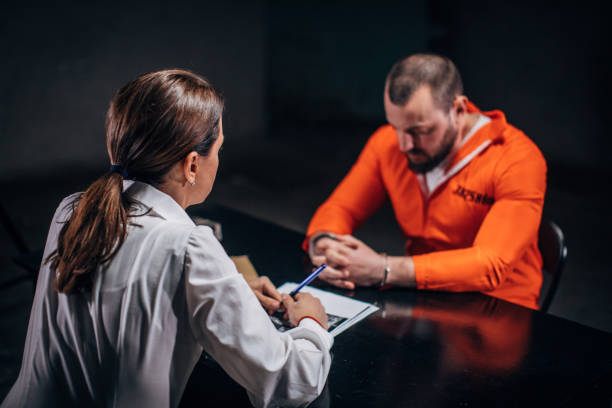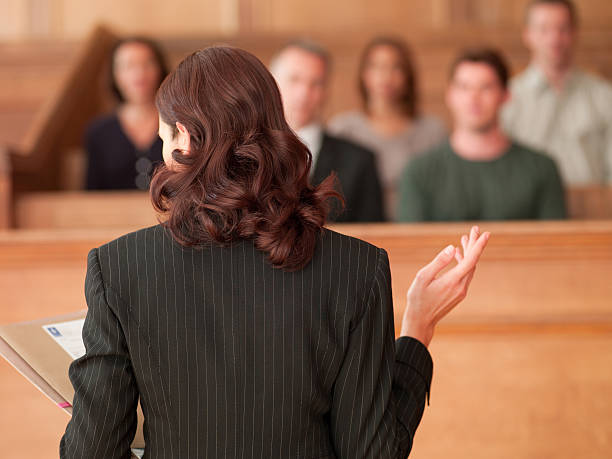Criminal Lawyers
Defenders of Justice and Protectors of Rights
Criminal lawyers serve a vital purpose in the legal system by defending individuals and organizations accused of criminal activities.
Who Are Criminal Lawyers
Criminal lawyers are specialized attorneys who focus on defending clients accused of crimes. These legal professionals possess in-depth knowledge of criminal law, procedural rules, and constitutional rights. Their role goes beyond representation in court—they are advocates who guide clients through investigations, negotiations, and trials. By leveraging their expertise, criminal lawyers ensure a fair legal process and work tirelessly to achieve favorable outcomes for their clients.

Roles and Responsibilities of Criminal Lawyers
The responsibilities of a criminal lawyer are diverse and often depend on the stage of a case. Their primary duties include:
● Analysis of Cases and Formulation of Strategies – Criminal attorneys carefully examine the evidence, consider prior rulings, and pinpoint any flaws in the prosecution’s case. They create a customized defense plan based on this data to safeguard the interests and rights of their clients.
● Legal Assistance – Criminal attorneys defend their clients in court from pre-trial proceedings until the verdict, making arguments, cross-examining witnesses, and introducing evidence to establish a compelling case.
● Plea bargaining and negotiation – Sometimes it’s a calculated strategy to bargain with prosecutors for fewer charges or punishments. To get the best results for their clients, criminal defense attorneys employ their negotiating abilities.
● Upholding the Rights Guaranteed by the Constitution – Making sure that their clients’ constitutional rights are respected is a crucial part of a criminal defense attorney’s job. This include safeguarding against self-incrimination, guaranteeing due process, and stopping illegal searches.
● Post-Trial Assistance – Even after a verdict is reached, criminal lawyers continue to support their clients by filing appeals, seeking reduced sentences, or advising on rehabilitation programs.
Why Do You Need a Criminal Lawyer
Being charged with a crime is a frightening event that can have serious repercussions, such as fines, jail time, and long-term harm to one’s reputation. A skilled criminal defense attorney offers the advocacy, expertise, and understanding required to negotiate the intricacies of the judicial system.
Here are key reasons to hire a criminal lawyer:
● Expert Knowledge of Criminal Law – Criminal lawyers are well-versed in legal statutes, procedural rules, and case law. This expertise enables them to craft strong defense strategies tailored to the specifics of each case.
● Protection of Rights – From the moment of arrest, individuals have constitutional rights that must be upheld. Criminal lawyers ensure these rights are not violated by law enforcement or prosecutors.
● The Strategic Defense – Since every criminal case is different, a customized strategy is needed. To evaluate the evidence, spot contradictions, and create a strong defense, criminal attorneys apply their analytical abilities.
● Minimizing Legal Repercussions – To lessen the impact on their client’s life, a competent attorney can bargain for reduced sentences, alternative sanctions, or rehabilitation programs—even in situations when a conviction is imminent.
The Process of Criminal Defense
Defending against criminal charges involves several stages, each requiring strategic planning and execution. Here’s an overview of how criminal lawyers work to protect their clients:
● Pre-Arrest Consultation – If an individual suspects they are under investigation, consulting a criminal lawyer early can prevent potential legal pitfalls. Lawyers provide guidance on interacting with law enforcement, protect against self-incrimination, and ensure evidence is obtained legally.
● Arrest and Charges – During the arrest and formal charging process, a criminal lawyer ensures that legal protocols are followed. They advise clients on their rights, challenge any violations, and work toward securing bail.
● Case Preparation – A thorough review of evidence, witness testimonies, and police reports forms the foundation of a strong defense. Criminal lawyers may collaborate with experts, such as forensic analysts, to strengthen their case.
● Trial Representation – In court, criminal lawyers present compelling arguments, cross-examine witnesses, and introduce evidence to create reasonable doubt. Their goal is to secure an acquittal or the most favorable outcome possible.
● Appeals and Post-Trial Support – If a conviction occurs, criminal lawyers can file appeals to challenge the verdict or sentence. They may also assist clients in exploring options for reduced penalties or rehabilitation.
Qualities of an Effective Criminal Lawyer
Choosing the right criminal lawyer can significantly impact the outcome of a case. Here are some qualities to look for:
● Experience and Expertise – An experienced lawyer specializing in criminal law will have a thorough understanding of the legal system and relevant precedents.
● Analytical Thinking – A top criminal lawyer excels in analyzing complex evidence, identifying inconsistencies, and crafting strategic arguments.
● Strong Communication Skills – Effective communication is crucial for presenting persuasive arguments in court and keeping clients informed about their case.
● Integrity and Professionalism – A trustworthy lawyer prioritizes their client’s best interests, maintaining confidentiality and professionalism throughout the case.
● A track record of success – Examining a lawyer’s prior cases and success rates can reveal information about how well they manage comparable circumstances.

How to Work Effectively with Your Criminal Lawyer
To maximize the chances of success, it’s important to establish a strong working relationship with your lawyer. Here are some tips:
● Be Honest – Share all relevant details about your case, even if they seem unfavorable. Transparency allows your lawyer to prepare effectively.
● Follow Legal Advice – Trust your lawyer’s guidance on how to approach the case, including what to say and how to behave during legal proceedings.
● Stay Informed – Ask questions to understand the progress of your case and the options available at each stage.
Get Started with Global Consultants
Submit your details below, and our experts will guide you through the process.
Contact Us for more details and to get started with your process!
FAQ
A criminal attorney defends people or groups who are charged with crimes. Among their duties include case analysis, defense strategy development, in-court client representation, plea bargain negotiations, and guaranteeing the constitutional rights of their clients are upheld.
A criminal lawyer provides the expertise needed to navigate complex legal systems, ensures your rights are protected, and helps build a strong defense. They can negotiate reduced penalties, challenge evidence, and aim for the best possible outcome in your case.
Criminal lawyers ensure your constitutional rights are upheld throughout the legal process. This includes safeguarding against self-incrimination, ensuring due process is followed, challenging unlawful searches, and protecting against prosecutorial misconduct.
Criminal attorneys deal with a variety of situations, ranging from minor transgressions like moving violations to more serious felonies including murder, assault, fraud, and drug-related charges.
You should consult a criminal lawyer as soon as you suspect you are under investigation or immediately after being charged. Early legal guidance can prevent self-incrimination, protect your rights, and help build a strong defense.
Seek out a criminal attorney who has a professional demeanor, a track record of effectively resolving cases comparable to yours, good analytical and communication abilities, and experience and competence in criminal law.
Plea bargaining is the process of negotiating a reduction in charges or fines with prosecutors. A competent criminal defense attorney may be able to avoid a drawn-out trial by using their knowledge and negotiating abilities to secure a favorable result.
The criminal defense process involves several stages, including pre-arrest consultation, case preparation, trial representation, and post-trial support. A criminal lawyer guides clients through each stage, providing legal advice and representation.
Yes, criminal lawyers can assist with post-trial support, such as filing appeals, seeking reduced sentences, or advising on rehabilitation options. They work to minimize the long-term impact of a conviction on your life.
To work effectively with your criminal lawyer, be honest about all case details, follow their legal advice, stay informed about the progress of your case, and maintain open communication throughout the process.
